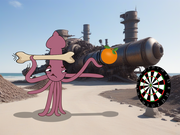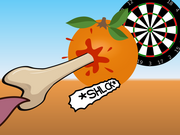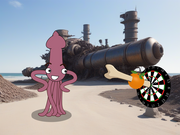中古汉语
Characters and words in 中古汉语
within / among / in / middle / center / while (doing sth) / during / (dialect) OK / all right
中
=
丨
+
口
:
Mnemonic symbol: a dart board, because you always try to hit the center.
Julian Giant Squid (zhu-) is throwing dinosaur bones (丨) as darts on a dart board in front of the engine ((e)ng1). To make it a bit more difficult he's throwing mandarins (口) into the air as well and skewers them up right in the center (中 is a mandarin skewered on a dinosaur bone) in mid flight with the dinosaur bones. He's still able to consistently hit the center (中) of the dart board.
Julian Giant Squid (zhu-) is throwing dinosaur bones (丨) as darts on a dart board in front of the engine ((e)ng1). To make it a bit more difficult he's throwing mandarins (口) into the air as well and skewers them up right in the center (中 is a mandarin skewered on a dinosaur bone) in mid flight with the dinosaur bones. He's still able to consistently hit the center (中) of the dart board.
medieval / Middle Ages / Chinese middle antiquity, 3rd to 9th centuries, including Sui and Tang Dynasties / Middle (of a language, e.g. Middle English) / used / second-hand
ancient / old / paleo-
古
=
十
+
口
:
Mnemonic symbol: at least on German maps, this character actually resembles a cloister.
Oh no! Gitta Giraffe (gu) found that the golden cross (十) broke off of the cloister (古) in the space station's living room (Ø3)! She skewers a mandarin (口) on top of the cloister so that she can skewer the broken off cross back on to fix it.
Oh no! Gitta Giraffe (gu) found that the golden cross (十) broke off of the cloister (古) in the space station's living room (Ø3)! She skewers a mandarin (口) on top of the cloister so that she can skewer the broken off cross back on to fix it.
Han ethnic group / Chinese (language) / the Han dynasty (206 BC-220 AD)
Words with 中古汉语
中古汉语
is not used as a component in another word.
Sentences with 中古汉语
中古汉语 currently does not appear in any sentence.





